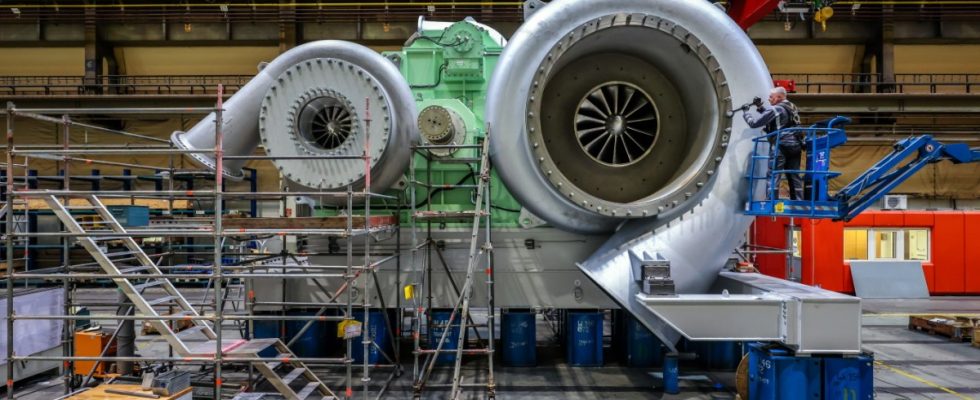It’s not about thousands of employees and it’s not about an extraordinarily promising future business in the field of cutting-edge technologies. Not about green hydrogen, artificial intelligence or robotics. Instead: Hundreds of employees at the Oberhausen and Zurich sites, who manufacture and service smaller gas turbines there. And yet the story, so shortly after the German-Chinese government consultations, has its own special charm.
What it’s about: Augsburg-based MAN Energy Solutions, a subsidiary of the Volkswagen Group, is selling its small gas turbine business to Chinese state-owned manufacturer CSIC Longjiang GH Gas Turbine Co (GHGT), which in turn has become the shipyard group China State Shipbuilding Corporation (CSSC). heard. The contract was signed this week, now the federal government has to approve the deal. According to insiders, however, this could take a while.
For the VW subsidiary and the hundred employees affected, things seem to be going well at first, and the investor has done everything to make the deal palatable to the seller. There is to be a five-year guarantee for the locations, and a GmbH is to be set up specifically for the business unit – Oberhausen gas turbines will therefore remain a German company for the time being and will be subject to German legislation.
But why are the Augsburgers selling their gas turbines, which are used in energy production, for example as mechanical drives in pipelines? And why are Chinese investors of all people interested in this relatively small business?
MAN is trying its hand at the big energy turnaround
“The gas turbines are no longer the focus of our growth plans,” said a spokesman on Wednesday. “For us, the business has no future.” One is therefore not ready to develop further generations of gas turbines, because this requires “staying power and a larger budget”. The company, which mainly works on large marine engines, decided three years ago to divest itself of the gas turbine business. Some time ago, MAN Energy Solutions boss Uwe Lauber outlined in the SZ interview what he is primarily concerned with in the future: his company should play an important role in the hydrogen market, which is also why its stake in the electrolysis manufacturer H -Tec-Systems increased from 40 to 100 percent. Wind energy, green hydrogen – the VW subsidiary is also trying its hand at the big energy transition.
Things are different at GHGT. So far, the manufacturer has only been active in China, and for a long time they have been looking for a way to gain a foothold in the European market. This has now been achieved with the Augsburg takeover. CHGT can act as a direct competitor to companies such as Munich-based energy technology manufacturer Siemens Energy. The parent company CSSC from Beijing, a ship and machine builder with almost 100,000 people on board, is also likely to play a not unimportant strategic role in all of this. Container ships, larger tankers, but also warships are part of the Chinese portfolio.
In 2011 the MAN Group lost its independence after more than 250 years
To understand how the takeover came about, you have to go back to 2011, the year in which the then Dax group MAN lost its independence after more than 250 years. MAN, once a conglomerate that built quite a lot from trucks to buses, diesel engines to printing presses, was swallowed up by the Wolfsburg carmaker Volkswagen. Not because anyone there was interested in the energy solutions from Augsburg. The then, now deceased, corporate patriarch and chief strategist Ferdinand Piëch wanted a car company that built everything that drove, from small cars to luxury sedans and motorcycles to trucks and buses.
The Augsburg subsidiary, which at the time was still called MAN Diesel & Turbo, became something of a foreign body in a group that didn’t really know what to do with the businesses it had acquired by accident. The idea of selling the daughter was repeatedly considered, but in the end they kept her – until further notice. MAN Energy Solutions currently has around 14,000 employees worldwide, with 1,600 people working for the engine and turbomachinery manufacturer in Oberhausen alone.

